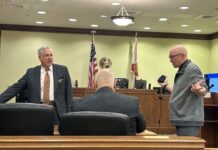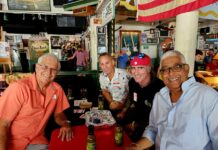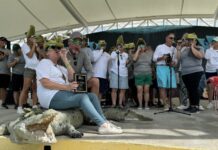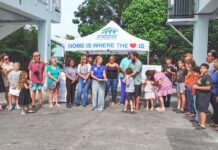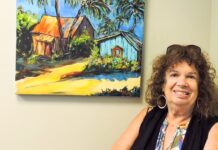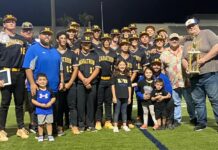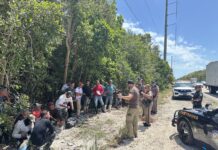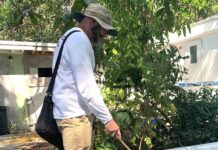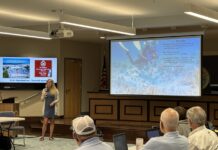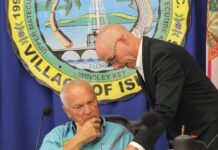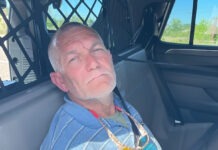When Elly Claire returned to her Big Pine home after Hurricane Irma, there was not only structural damage, but also two feet of standing water. The project of rebuilding the house from the ground up was truly a community effort.
“First, the Coast Guard painted the outside, then the group from Looe Landing — all the families came and helped with the spackling — and then during spring break the students from Hood College in Frederick, Maryland put up all the ceilings, then the four bottom feet of cement board was Diana Nyad and her group Everwalk … and then Habitat (for Humanity) came in.” Habitat for Humanity is completing the kitchen and back bathrooms and deck. Claire will enjoy a homecoming in her “new” place this week.
While Claire’s experience is unique, having to patch together construction aid via non-profits and community brawn is not unusual for Keys residents. After Hurricane Irma, the Keys experienced a serious demand for skilled labor, and often the needs of the islands were not being met.
Kiersten VanSickle is one such worker; she moved to the Keys after seeing a Habitat for Humanity ad seeking laborers. Originally from Wisconsin, VanSickle was working on construction with an AmeriCorps program in South Carolina.
“I was searching for disaster recovery jobs, and this popped up,” VanSickle says. She has worked with Habitat in the Keys for a month, primarily in Habitat Landing in Big Pine, as well as other private residences like Claire’s home.
VanSickle is one of two women in Florida Keys Community College’s new apprenticeship program, launching this fall. Like many new students, she already has experience, having done “a little bit of everything” on construction sites in South Carolina and the Florida Keys. Her supervisor at Habitat, Marty Elek, suggested she sign up for the program. Habitat is one of the local businesses that have offered to sponsor students at FKCC, which boasts being a tuition-free, four-year program.
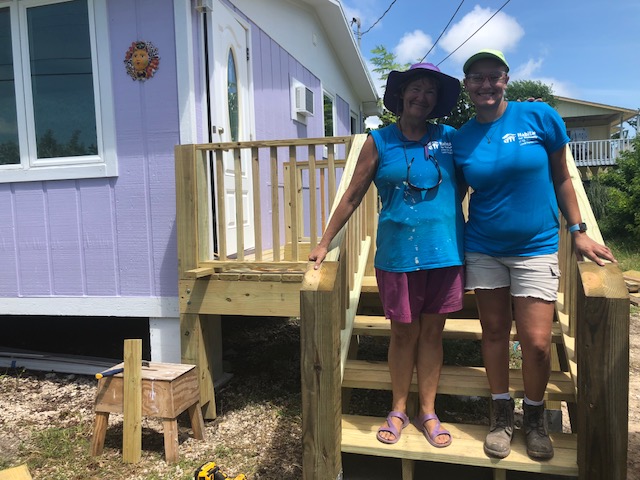
FKCC has launched carpentry and electrical apprenticeships, and at the core of the program is addressing the severe need for skilled labor. FKCC President Jonathan Guevarra teamed up with County Commissioner Heather Carruthers to initiate a project that had been many years in the making. “The vision was basically to have this building that was more or less going to be like a barn,” said Guevarra, “that we could break down, put together, do wiring, rip it out, another group could come in and start from scratch.” The benefactor of the program passed away and funding fell through. When Hurricane Irma hit, Guevarra and the team at FKCC knew that the community had come to a breaking point.
Carruthers and Guevarra agree that not only is there a need for the labor, but also an affordable housing crisis. The program is aimed at addressing these needs concurrently. Guevarra describes the problem of bringing down contractors from the mainland in the wake of the storm: they require lodging while working, which landlords pay, not only effectively occupying local housing with mainlanders, but also putting landlords in a position of needing to charge higher rent to cover the cost. “We live in a free economy,” Guevarra said. “This will be a vicious cycle.”
The program balances full-time on-the-job training with twice-weekly classroom instruction. At the conclusion, an apprentice will be considered a “journey worker” and will receive a four-level certification by the National Center for Construction Education and Research (NCCER) as well as a nationally-recognized Completion of Apprenticeship certificate by the State of Florida.
“We didn’t just create a program where people go out and learn the skill,” Guevarra said. “They also get a credential where they can go not only to another state but anywhere else in the world.”
That’s where Wayne Garcia and Ron Leonard, of Check Electric, come in. Both local contractors, Garcia and Leonard have signed on to be instructors for the program, and they have sponsored employees from their respective companies.
“I’ve lived here all my life,” said Leonard. “My family are Conchs, and I saw a way to help the community and the contractors in town. It’s hard to get help any more. We really needed this.” While it’s Leonard’s “first time teaching officially,” he said he’s “been teaching for 30 years on the job.” Leonard and Garcia are lecturing and giving hands-on instruction. The feeling in the classroom is collaborative, with both instructors offering personal experience through practical, often funny, anecdotes or fun facts; for example, Gatorade’s sodium content can make a person more of an electrical conductor.
Guevarra hopes to expand, not only from carpentry and electrical to plumbing and HVAC, but also geographically. “The future has got to look like this,” he said. “We started it out primarily in Key West, and we are going to expand it into Marathon and the Upper Keys. We are going to work with our K-12 partners, to get it into the high schools so young people are exposed to a variety of options.”
Leonard said the labor shortage needs to be addressed now. “It’s not just here, it’s countrywide. It’s because the age group that is coming up, they never had the opportunity to learn this kind of stuff, because it was all taken out of the classroom. There are so many people that are really smart and know how to do things with their hands. And that’s what school needs as well — people who can do things with their hands.”
People like VanSickle, who is doing things with her hands while thinking ahead. “I hope to stick around as long as Habitat needs me down here,” she says. “The way our global weather pattern is seeming to go, there’s always another disaster. We’ll always have a job somewhere.”
More information is at www.fkcc.edu/apprenticeships.
